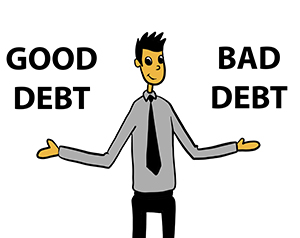 Being that I work in equipment finance, I need to clear a little something up in regards to debt: Contrary to what you might hear on the TV and such, debt is not evil, debt is not bad, and debt is not responsible for the economic slowdown.
Being that I work in equipment finance, I need to clear a little something up in regards to debt: Contrary to what you might hear on the TV and such, debt is not evil, debt is not bad, and debt is not responsible for the economic slowdown.
At least not good debt.
What is Good Debt?
What’s the difference you ask? Well, it’s really pretty simple. Good Debt is debt that makes a company stronger, because it addresses essential components of the business. Good debt makes a company more efficient, and makes money. Buying new machines, upgrading a fleet, hiring key personnel, launching new products, upgrading software are all things that directly pertain to cash flow and the bottom line.
Understanding Bad Debt
Bad Debt, for lack of a better term, is debt that does not directly contribute to the bottom line or production. The name is a misnomer, as the debt isn’t necessarily bad. However, it’s not essential in generating revenue. For instance, borrowing money to refurbish the cafeteria area might be considered bad debt. While it’s a commendable expenditure, it might not be the best choice during an economic downturn.
In a sluggish economy, a wise company will aim to increase its good debt expenditures while minimizing bad debt.
Now, you might ask, why would any debt be good during slow economic times?
The answer is simple: It’s in slow times that companies distinguish themselves from their competitors.
Consider this: in prosperous times, everyone has ample money to spend. Remember the dot com bubble? Companies that merely mentioned ‘streaming online applications’ were given tons of cash to spend. It wasn’t until the crash that the real players emerged. These companies invested money during the dot com bust and emerged from the challenging times stronger. The pretenders, who largely spent money on non-essential aspects, didn’t fare as well.
A resilient company that upgrades its ERP system, purchases new production equipment, or recruits a new marketing guru during tough times actually becomes stronger in the end. Sometimes, good debt can pay for itself (or come close to it) immediately if the efficiency savings are greater than the finance payment. This happens more often than you might think.
Bad Debt (for lack of a better term) is debt that does not relate to the bottom line or production. Now, the name is a misnomer, because the debt really isn’t bad. But it’s not essential in making money. So in slow economic times, this type of debt is indeed bad (hence the name). A good example is borrowing money to re-do the cafeteria area. While that’s a nice thing to do, and certainly a worthy way to spend money, it might not be the best choice of projects in an economic downturn.
In a slow economy, a smart company will look to increase good debt expenditures, while decreasing the amount of bad debt it takes on.
Now I can hear the question, why would ANY debt be good in slow times?
The answer is simple: It’s in slow times that companies separate themselves from each other.
Think about this logically, in good times everyone has gobs of money to spend. Remember the dot com bubble, where companies that just mentioned the words ‘streaming online applications’ were given tons of cash to spend? It wasn’t until the crash that the real players emerged. These companies actually spent money during the dot com bust, and came out of the dark times stronger for the experience. But the pretenders that largely spent money on game rooms and employee lounges didn’t emerge at all.
A strong company that upgrades its ERP system, or buys new production equipment, or takes on a new marketing guru during tough times actually comes out stronger in the end. Good debt can even pay for itself (or come close to doing such) right away sometimes financing equipment to get more efficient is a no-brainer if the efficiency savings are greater than the finance payment. This happens all the time.
So again, debt, in and of itself, is not bad. Just make sure your debt is good debt, and you’ll be fine.
